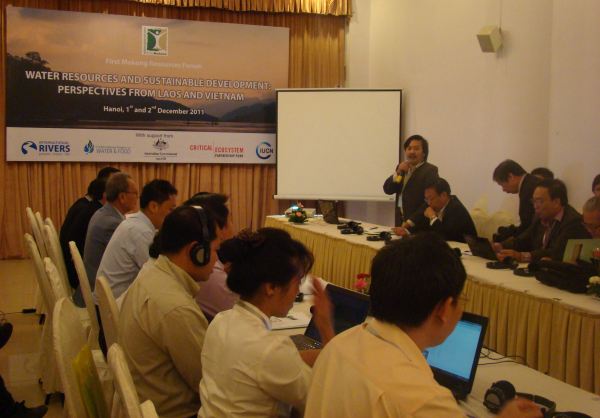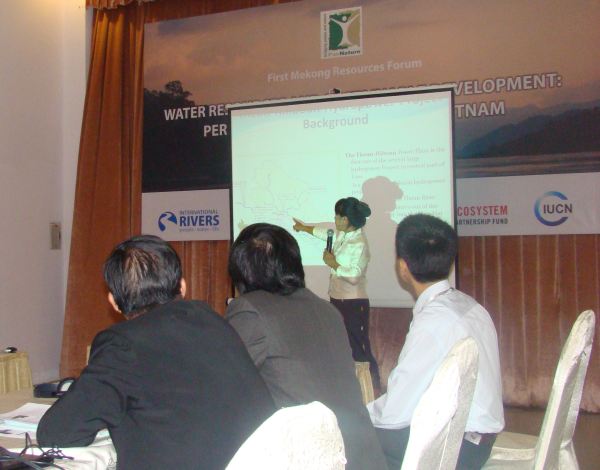Tucked away in the highlands of Hà Giang, the small…

The First Mekong Resources Forum: Water Resources and Sustainable Development – Perspectives from Laos and Vietnam
Water is vital for all livings, development and prosperity of every nation. Water sources from rivers, lakes and wetlands not only maintain ecological functions and biodiversity, but also supply water for domestic uses, agricultural production, energy and navigation; ensure food security, nutrition, cultural customs, and traditional livelihoods; particularly for rural communities living close to water bodies. Consequently, sustainable water resources management has increasingly been mainstreamed into policy agenda of many governments.
While water resources play as a source and motivation for development, utilization of this natural asset could also result in competition and governance challenges at local, national and regional levels driven from water pollution, environmental degradation and unsustainable use – particularly in river basins that priorities are more than often given to economic growth and development. Under the pressures of economic development, water resources from inland and transboundary rivers in Laos and Vietnam are facing trade-offs for hydropower development, infrastructure construction, and expansion of extractive industries.
Obviously, Laos and Vietnam are mutually dependent in term of water resources by the facts that Vietnam is one of leading investors in Laos, where many of their development projects could cause negative impacts on watersheds and water resources, such as commercial logging, cash crop plantation, hydropower dam construction, and mining. On the other side, the plan to develop mega hydropower projects on the mainstream Mekong river has raised concerns in Vietnam over potential negative impacts and long-term risks for river flows, water quality, sedimentation, aquaculture and aquatic products, local livelihood, and development opportunities in the Mekong Delta in the future.
Watersheds of some main rivers in Vietnam (such as Ca and Ma rivers) come partly from Laos’ territory. Therefore, water flows of these rivers are significantly dependent on watershed forests in Laos. Both countries share common concerns and interests in regard to watershed and river basin planning and management. The trend of development of hydropower dams on both mainstream Mekong river and tributaries in Laos and Vietnam in recent years has also drawn much attention and participation of different stakeholders due to existing and potential negative environmental and social impacts.
In order to facilitate and promote exchanges and collaboration between scientists, research organizations and civil society institutions of the two countries, with supports from International Rivers (IRs), Critical Ecosystems Partnership Fund (CEPF), the CGIAR Challenge Program on Water and Food (CPWF, through funding from the Australian Government), and the International Union for Conservation and Nature (IUCN), PanNature organized and facilitated the workshop “Water Resources and Sustainable Development: Perspectives from Laos and Vietnam”. The initial concept and arrangement for this workshop has been discussed and supported by a number of experts, local and international organizations in both Laos and Vietnam.

First Mekong Resources Forum. Photo: PanNature.
The two day workshop, organized on 1-2 December 2011, is part of the Mekong Resources Forum, a new initiative recently developed by PanNature that aims at facilitating meaningful dialogues on resource governance and its associated issues among regional scientific and civil society organizations in the Greater Mekong Sub-region. This non-state platform will include a wide variety of dialogues, exchanges and cooperation activities built upon mutual interests and power of knowledge for bettering natural resource governance in the region.
The workshop programmed for one day of in-door presentations and discussions and another day for field-trip to visit Hoa Binh Hydropower Plant. The presentations featured with updated information about policies and practices related to water resources utilization and management, river basin planning, aquatic biodiversity as well as social and environmental impacts of hydropower and other development forms to inland and transboundary rivers of Laos and Vietnam.
The field trip to Hoa Binh province included a visit to Hoa Binh Hydropower Plant and meeting with a downstream community at Yen Mong commune.
Workshop Presentations
Water Security and Sustainable Development in the Lower Mekong Basin
Mr. Nguyen Viet Dung – People and Nature Reconciliation
Water Resources Management and River Basin Planning in Lao PDR: Cased on Nam Ngum River Basin
Mr. Souphasay Komany – Laos Ministry of Natural Resources and Environment
Water Resources Management and River Basin Planning in Lao PDR
Kongngeun Chounlamountry, Assistant Director General Department of Water Resources MONRE
Water Resources Management and Stakeholder Roles in RBO in Vietnam
Dr. Dao Trong Tu – Center for Sustainable Water Resource Development and Climate Change Adaptation
Environmental and Social Impacts of Hydropower Development in Lao PDR
Ms. Amphay Dalasouk – Faculty of Environmental Studies, Laos National University
Hydropower Development: Environmental and Social Impacts in Vietnam
Dr. Dao Trong Hung – Vietnam Institute of Science and Technology
Live and Livelihood of Resettled Communities from Hydropower Projects
Mr. Pham Quang Tu – Consultancy on Development Institute
Potential Impacts of Hydropower Projects on the Fish Resources and Aquatic Biodiversity. Case studies in Hoa Binh Dam (1996) and Sesan 5/1 Dam (2008)
Prof. Mai Dinh Yen – Hanoi National University, Vietnam
Mekong River Needs a Serious Common Action
Dr. Houmphanh Rattanavong – Laos Biodiversity Association
Aquatic Resources and River Base livelihoods of Local Communities in Laos
Dr.Bae Phiaxay – Falcuty of Environmental Studies, Laos National University
Payment for ecosystem services in Vietnam: Opportunities and Challenges
Dr.To Xuan Phuc – Forest Trends
Policy and State of Watershed Forest Management in Lao PDR
Dr. Anoulom Vilayphone – Faculty of Forestry, Laos National University
Hoa Binh Hydropower: Impacts on Resettled and Downstream Communities
Mr. Dan Phuc Tiep – Hoa Binh Union of Science and Technology Associations

Presentation on social and environmental impacts of hydropower projects in Laos. Photo: PanNature.
The event attracted participation of 70 representatives from Lao and Vietnam. Participants agreed that there should be more open dialogues among different stakeholders in the Mekong region to share common concerns, understanding, and cooperation for better governance of natural resources for peaceful and sustainable development in the region.
More Detailed Information



